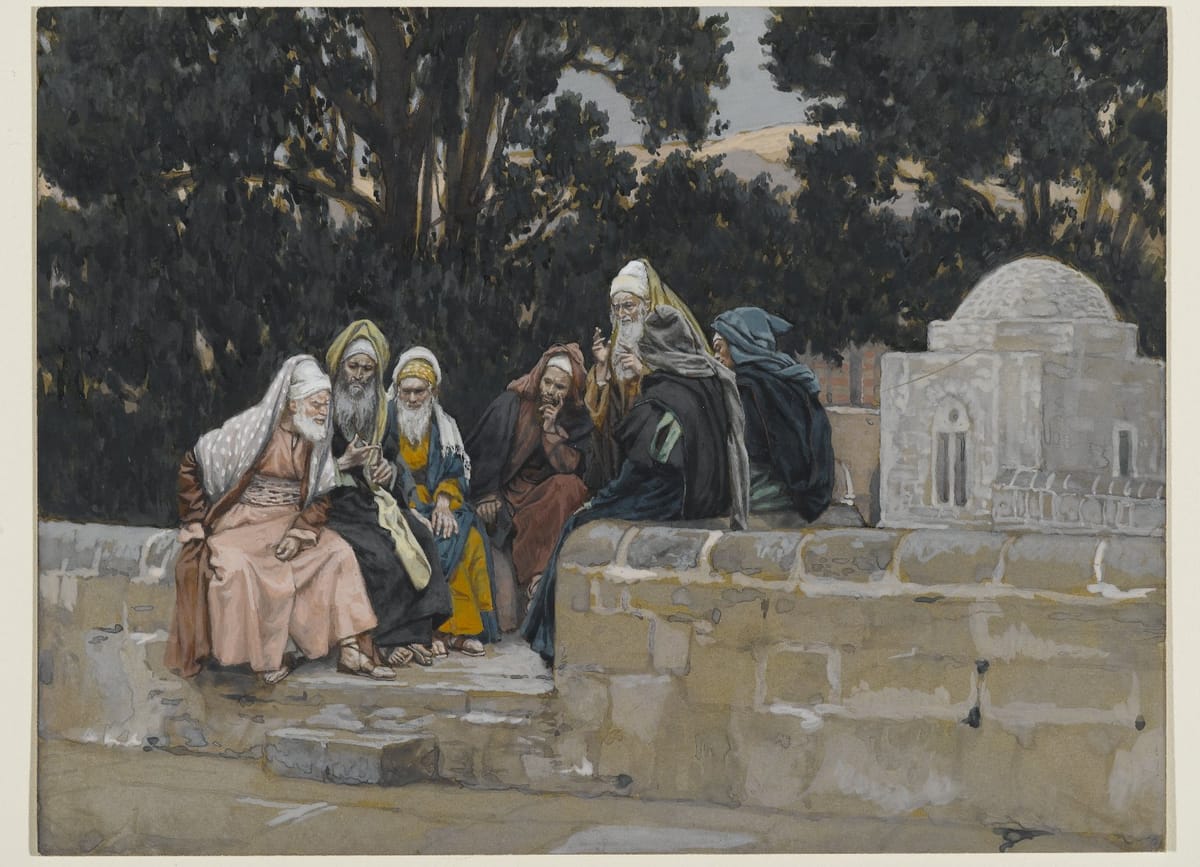Jesus and Beit Hillel (Part 2!)
And Matthew 23. Let's have a look.

This is Life as a Sacred Text 🌱, an everybody-celebrating, justice-centered voyage into ancient stories that can illuminate our own lives. It‘s run on a nonprofit, so it’s 100% NAZI FREE. More about the project here, and to subscribe, go here:
Hi! So this is Part Two of a three part series on an influential Second Temple-era Jew and what might have been his Jewish context. I'm doing a little textual speculation. (Also new this week: The little grey circles? New! Improved! Footnotes! Click on them for the bonus material.)
If you haven't read Part One, you might be pretty confused walking in here, particularly if you don't have a background in this kind of stuff. I've already begun to tee up my argument in many ways, so maybe go read that before reading this, if you haven't already.


OK, I read Part One, I'm ready– but...
Jesus the… Pharisee?
First of all:
There is a very popular (and antisemitic) belief that in the Gospels, Jesus only criticizes Pharisees, calling them hypocrites, terrible stinky bad baddies in a thousand different ways. (We’ll unpack some of that in a moment. )
But, like, even in the Gospels, Jesus hung with Team P plenty of times.
We see, in the Gospel of John, an ongoing relationship with a Pharisee (later revealed to be on the Sanhedrin) named Nakdimon/Nicodimous, eg in John 3:1-2, he clearly refers to him:
Now there was a man of the Pharisees named Nicodemus, a ruler of the Jews. This man came to Jesus by night and said to him, “Rabbi, we know that you are a teacher come from God, for no one can do these signs that you do unless God is with him.”
Nakdimon also shows up after Jesus’ death, helps pay for the burial expenses.
The Pharisees had Jesus’ back!
At that very hour some Pharisees came, and said to him, “Get away from here, for Herod wants to kill you.” (Luke 13:31)
And most of all: Pay attention to who’s listening to Jesus in so many of these stories. Who’s in the audience, engaging with him, questioning, debating? Pharisees, Pharisees, Pharisees. Because they’re doing their thing together: Jamming (on Jewish law) in the name of the Lord.
Because, y’all:
Arguing and questioning and debating is what the Rabbinic tradition is ALL ABOUT.
You know that crack, “two Jews, three opinions?”
RABBINIC JUDAISM.
aka "The era and enduring framework of Judaism that started with the Pharisees." Yeah.
I submit:
Jesus argued like a rabbi.
And taught like a member of the School of Hillel.
(Most of the time.)
Hillel and Shammai were two of the most important teachers in my tradition. They were bar plugtot —uh, not sure how to translate this, there’s no real concept for this in our culture.
They were each other’s debate partners.
The people who habitually disagreed with each other but who, through the process of playing out their disagreements, sharpened one another’s thinking. This is a thing in Rabbinic tradition. It’s part of the culture.
We throw hard. And then we go to each other’s houses for Shabbat dinner.
What is [an example of] an argument for the sake of Heaven? The arguments between Hillel and Shammai. (Pirke Avot/Sayings of the Sages, 5:17)
My suspicion is that when non-Jews read the interactions between Jesus and the Pharisees in the Gospels– particularly given the perhaps deliberately unflattering lens in which they may be refracted – they may see ferocious rebuke and fearsome condemnation. [[1]]
I read the Gospels and assume that Jesus and "the Pharisees" (it'll make sense in a moment why they're getting quote marks like that) are sometimes engaged in earnest debate, sometimes jabbing in jest, sometimes possibly angry and hurt, sometimes just... living in community, and disagreement?
What if the perimeters of those conversations have the level of shared communal not only– consent, but agreement– that a rap battle does? Everybody who agrees to show up, agrees to the terms?
I'm here to bring you Bible-themed battle rap. (Yes, it's a Christian battle rap league.)
Hillel and Shammai each taught many students, who then taught students. Their students are known as Beit Hillel and Beit Shammai—the House of Hillel or the School of Hillel and etc. of Shammai.
Although Beit Hillel prohibit the marraige of rival wives to the brothers [in cases of levirate marriage] and Beit Shammai permit them, and although these disqualify these women and those deem them fit, Beit Shammai did not refrain from marrying women from [families of] Beit Hillel, nor did Beit Hillel refrain from marrying women from Beit Shammai. Furthermore, with regard to all of the disputes concerning the laws of ritual purity and impurity, where these rule that an article is ritually pure and those rule it ritually impure, they did not refrain from handling ritually pure objects each with the other, as Beit Shammai and Beit Hillel frequently used each other’s vessels. (Mishnah Yevamot 1:4)
You see? They had directly contradictory rulings from one another, but they still– lived as though the other's ruling was kosher: They were popping in and out of each other's homes! Borrowing each other's stuff as though nobody was worried that the other's kitchen wasn't up to snuff around ritual purity! Marrying each other's people– they were family! They were community! These contradictory rulings about what God said was OK to do and not to do – and the long fights and debates that accompanied them– didn't preclude the bread-breaking.
People often get their knickers in a twist about this passage:
Then Jesus said to the crowds and to his disciples: “The teachers of the law and the Pharisees sit in Moses’ seat. So you must be careful to do everything they tell you. But do not do what they do, So you must be careful to do everything they tell you. But do not do what they do, for they do not practice what they preach. They tie up heavy, cumbersome loads and put them on other people’s shoulders, but they themselves are not willing to lift a finger to move them. (Matthew 23:1-4)
The Talmud says the House of Hillel was
agreeable & forbearing, and when they taught, they would teach both their own statements & the statements of the House of Shammai. When they cited a dispute, they prioritized the statements of Beit Shammai to their own. (Talmud Eruvin 13b)
Reread Jesus' statement in light of him being part of the House of Hillel, both accepting the legitimacy of the House of Shammai's opinions and perhaps feeling a little salty that the deference and respect the House of Hillel extended wasn't reciprocated. I'm just saying.
Now imagine Jesus’ comments, above, said in that tone of jesting snark you’d offer a sibling, or with the taunting attitude you’d hit when some of the guys from the rival team come to check out your practice. Everybody’s still playing hockey! Everyone’s still in the league! They could be your teammates next week! There’s just some smack being talked.

It did get contentious at times, after all:
From the time that the disciples of Shammai and Hillel grew in number, and they were disciples who did not attend to their masters to the requisite degree, dispute proliferated among the Jewish people and the Torah became like two Torahs. (Sanhedrin 88b)
Listen, I don’t really think we can get to what was actually going on in any of the passages in the Gospels– remember how much later the Gospels were written than the life of the guy, and separating history from legend from agenda is as impossible a task here as it is with any of the tales in the Mishnah, Talmud, Torah, or elsewhere. (And likewise, that impossibility doesn’t mean it’s not a sacred text.)
But the point remains: There are more ways to understand what’s happening here than might be evident at first blush. [[2]]
Was there even some question about how academic some of Beit Shammai’s positions were? (That is, whether they always practiced what they preached?) Even if they tended to take the more stringent side, generally? Hmm:
Reish Lakish said to him: Do you hold that Beit Shammai actually acted in accordance with their own statement? Beit Shammai did not in fact act in accordance with their own statement, as the dispute was merely theoretical. And Rabbi Yoḥanan said: Beit Shammai certainly did act in accordance with their opinion. The later Talmudic voice comments: And this is also reflected in the dispute between Rav and Shmuel, as Rav says: Beit Shammai did not act in accordance with their own statement, and Shmuel said: They certainly did act in that manner. (Talmud Yevamot 14a)
From the Talmud’s perspective, the reason that Beit Shammai might not have followed their own rulings is either a) because everyone understood that the rules of the game are that we follow the majority opinion– which would be Beit Hillel’s– or, b) that they started following Beit Hillel after a literal voice came out of Heaven to say that we hold by Hillel, as the story goes, (Talmud Eruvin 13b).
So from this read, Beit Shammai weren't hypocrites– but they were, perhaps, not doing what they argued was Correct, just grumblingly following Hillel’s opinions as a good-sport concession that they had lost the dispute.
But taking all this into consideration, it does illuminate the Matthew passage above a bit, no?
So. I'm going to make a suggestion that is neither wholly original, nor does it have universal scholarly consensus (does anything, especially where Jesus is concerned?)
Other people have great evidence for other theories and someone might come along with something that might actively disprove this one, great, happy to learn. But I'd like you to consider this lens with me:


